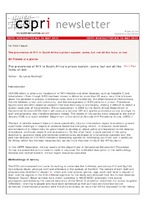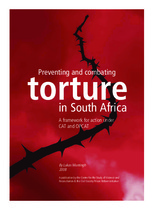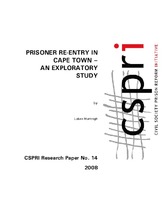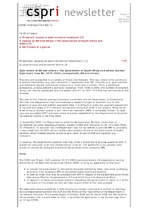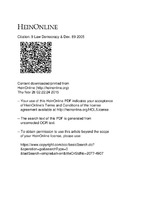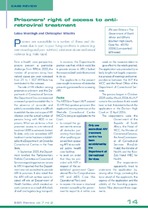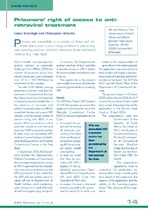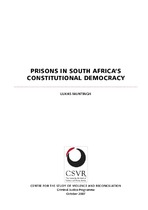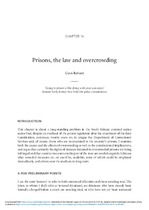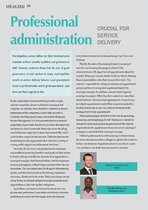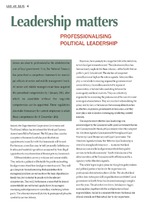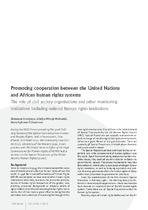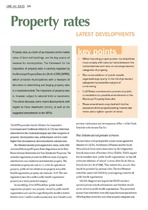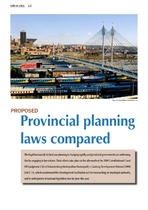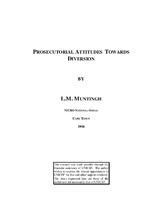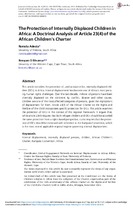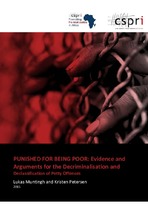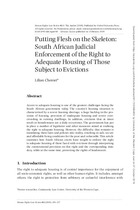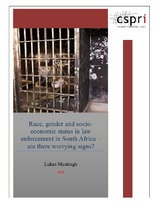Browsing Dullah Omar Institute for Constitutional Law, Governance and Human Rights by Title
Now showing items 237-256 of 364
-
The prevalence of HIV in South Africa's prison system: some, but not all the facts, at last
(Civil Society Prison Reform Initiative, 2008-05-26)The lack of reliable research data and more specifically, data on intervention impact evaluations, present a particular challenge in respect of evidence-based law and policy reform. In resource-constrained environments it ... -
Preventing and combating torture in South Africa: a framework for action under CAT and OPCAT
(Centre for the Study of Violence and Reconciliation & Civil Society Prison Reform Initiative, 2008)This booklet aims to provide more information to decision-makers and stakeholders on the challenges relating to preventing and combating torture; and also outlines South Africa’s obligations under CAT and OPCAT. These two ... -
Prisoner re-entry in Cape Town - an exploratory study
(Civil Society Prison Reform Initiative, 2008)This study is concerned with the immediate post-release period and asked a very simple question: “What happens to people immediately after they have been released from prison?” The question is aimed at gaining a deeper and ... -
Prisoners' access to anti-retroviral treatment
(Civil Society Prison Reform Initiative, 2006)Prisoners are susceptible to a number of illness and diseases. This may relate to the conditions of prisons themselves (e.g. poor ventilation is associated with TB), life style (e.g. poor nutrition and substance abuse), ... -
Prisoners' rights litigation in South Africa since 1994: a critical evaluation
(Law, Democracy & Development, 2005)It is a sad fact that there is often a huge gap in South Africa between the constitutional promise of a life lived with dignity and respect, on the one hand, and the actual lived reality of people who are supposed to be ... -
Prisoners’ right of access to antiretroviral treatment
(ESR Review, 2006)Prisoners are susceptible to a number of illness and diseases due, in part, to poor living conditions in prisons (e.g. overcrowding and poor nutrition), substance abuse and sexual violence (e.g. male rape). The rate of HIV ... -
Prisoners’ right of access to antiretroviral treatment
(ESR Review : Economic and Social Rights in South Africa, 2006)Prisoners are susceptible to a number of illness and diseases due, in part, to poor living conditions in prisons (e.g. overcrowding and poor nutrition), substance abuse and sexual violence (e.g. male rape). From a health ... -
Prisons in South Africa's constitutional democracy
(Centre for the Study of Violence and Reconciliation, 2007-10)In this article it will be argued that to make prisons compatible with a constitutional democracy, as understood in South Africa, four requirements need to be met. First, the prison system must have an underlying philosophical ... -
Prisons, the law and overcrowding
(Wits University Press, 2014)This chapter is about a long-standing problem in the South African criminal justice sector that, despite an overhaul of the prison legislation after the enactment of the final Constitution, continues, twenty years on, to ... -
Professional administration : crucial for service delivery
(Community Law Centre, University of the Western Cape, 2011)Municipalities cannot deliver on their developmental mandate without suitably qualified and professional staff. However, evidence shows that the lack of good governance of staff matters in many municipalities results in ... -
Professionalising political leadership: Leadership matters
(Community Law Centre, University of the Western Cape, 2010)Moves are afoot to professionalise the administrative arm of local government. First, the National Treasury has prescribed a competency framework for municipal officials at senior and middle management levels. All senior ... -
Promoting cooperation between the UN and African human rights systems
(ESR Review : Economic and Social Rights in South Africa, 2012)During the NGO Forum preceding the 52nd Ordinary Session of the African Commission on Human and Peoples Rights, held in Yamoussoro, Cote d'Ivoire, in October 2012, the Community Law Centre (CLC), University of the Western ... -
Property rates - latest developments
(Community Law Centre, University of the Western Cape, 2010)Property rates, as a form of tax imposed on the market value of land and buildings, are the key source of revenue of municipalities. The framework for the imposition of property rates is carefully regulated by the Municipal ... -
Proposed provincial planning laws compared
(Community Law Centre, University of the Western Cape, 2012)The legal framework for land use planning is changing rapidly, and provincial governments are addressing this issue by engaging in law reform. Their efforts takes places in the aftermath of the 2009 Constitutional Court ... -
Prosecutorial attitudes towards diversion
(NICRO National Office, 1998)This report investigates a number of issues relating to diversion in an effort to make certain recommendations with regard to the running and management of diversion with a particular emphasis on the discretionary powers ... -
The protection of internally displaced children in Africa: A doctrinal analysis of article 23(4) of the African children’s charter
(Cambridge University Press, 2021)This article considers the protection of, and assistance for, internally displaced children (IDCs) in Africa. Internal displacement has become one of Africa’s most pressing human rights challenges. Over the last decade, ... -
Punished for being Poor: Evidence and Arguments for the Decriminalisation and Declassification of Petty Offences
(Dullah Omar Institute, 2015)The Ouagadougou Declaration and Plan of Action on Accelerating Prison and Penal Reform in Africa of 20031 endorsed recommendations calling for reducing the size of prison populations in Africa. The Plan of Action recommended ... -
Punishment and deterrence: don’t expect prisons to reduce crime
(SA Crime Quarterly, 2008)The belief is thoroughly entrenched that prisons fulfil the triple function of punishing offenders, making society safer by removing dangerous individuals, and deterring potential offenders from committing crime. The fact ... -
Putting Flesh on the Skeleton: South African Judicial Enforcement of the Right to Adequate Housing of Those Subject to Evictions
(Human Rights Law Review, 2008)Access to adequate housing is one of the greatest challenges facing the South African government today. The country’s housing situation is characterised by a severe housing shortage, a huge backlog in the provision of ... -
Race, gender and socio-economic status in law enforcement in South Africa – are there worrying signs?
(Community Law Centre, University of the Western Cape, 2013)In the South African context the right to equality has particular significance given the country’s history of statutory unfair racial discrimination. This paper investigates, based on quantitative data, how different ...

